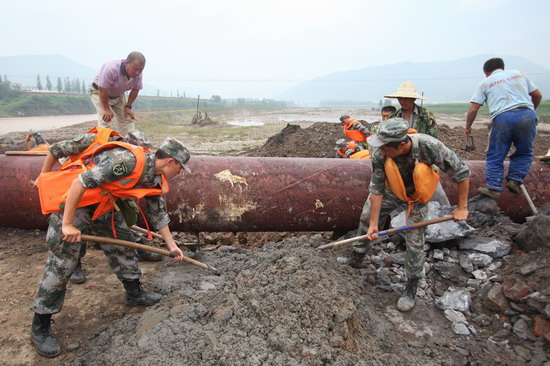Tap water set to resume after floods in NE China
The end might be in sight for 330,000 residents of Tonghua city of Northeast China's Jilin province, who have had to live without tap water for the past three days after floodwater cut off all water supplies to the city over the weekend.
 |
|
Soldiers repair a flood-damaged water pipe on Tuesday on the outskirts of Tonghua, Jilin province. |
"We plan to resume water supplies to the city at 4:30 pm on Wednesday after the construction of a temporary pipeline is completed by noon today," Wang Runmin, chief of the city's public utility bureau, told China Daily.
The new 350-meter-long temporary pipeline is being built on a bridge over the Hani River. The original four pipelines, which were built 25 years ago beneath the bridge, were destroyed by floodwater on Saturday.
Although the new pipeline will be in place on Tuesday, Wang said authorities did not rush to resume water supplies for sanitary reasons.
"The trial of the new pipeline will not begin until early on Wednesday morning, after we have set the cement which is used to support the pipe and have completed disinfection." Wang said.
It will take eight hours to transfer water from source to households, he said, so residents will not be able to have running water until late afternoon.
The bridge has also been reinforced, as weather forecasts show that a new round of rainfall will start in Tonghua on Wednesday.
However, the temporary pipeline can supply only up to seven tons of tap water per day, compared to the city's actual need of 10 tons.
"As an emergency measure during this tough time, we will order bath centers and car washes to stop doing business to make up for the shortage," he said.
The construction of permanent water pipelines will start as soon as the flood season is over and will take three months to complete, Wang said.
Authorities plan to carefully select the site for the new pipelines, because the original four pipes were built on the lower reaches of the Hani River, which proved vulnerable when the flood struck.
Hospitals in Tonghua have found it difficult to carry out their work since the water was cut off.
"We have to rely solely on bottled water to perform disinfection," Wang Li, a nurse at Tonghua People's Hospital, said as she poured water onto a doctor's hands before surgery.
After being left without tap water for more than 72 hours, Tonghua residents calmed down on Tuesday and became less worried about the water shortage.
"Everyone rushed to supermarkets to buy bottled water when the water was first cut off, worrying that it might be sold out and the price would go up," said 45-year-old Liu Shujuan, who was filling up her red plastic bucket with water from a fire truck clearly marked "undrinkable water".
About 25 fire engines were dispatched to 22 communities to provide underground water to Tonghua residents from 5 am to 9 pm.
The water is only used to flush the toilets or wash clothes after local authorities warned it was unsafe to drink.
"The price of bottled water remains the same and we have continuous access to water for domestic use," said Liu, who complained about being unable to shower for three days.
City authorities have pledged to ensure adequate supplies of bottled water and have vowed to crack down on price gouging.
However, prices have risen for large plastic buckets to carry and store water.
"In some stores, the price of a bucket, which could hold about 10 liters of water, almost doubled," Liu said.
Residents of Tonghua are not alone in their suffering. In Longjing city of Yanbian in southeastern Jilin, about 260,000 people have also been left without water for more than six days and the city's government has ordered fire trucks to dispatch water to local residents, China News Service reported.
In Dandong city in Northeast China's Liaoning province, the rain has also disrupted water supplies to more than 12,000 households.
The torrential rain has made the Yalu River, the Dandong's main source, too muddy for the water plant to be able to purify it, Xinhua News Agency reported.
In Antu county, Jilin, some villages have suffered from blackouts after telecommunications, transportation and power supplies were cut off.
 0
0 







Go to Forum >>0 Comments